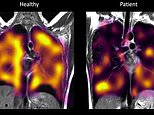Long Covid sufferers may have hidden damage to their lungs, new MRI scan study reveals
Long Covid sufferers have hidden damage to their lungs that conventional tests do not pick up and could explain breathlessness, new study reveals
Researchers used new techniques to show lung damage in those with long CovidThe small studies findings are now being built upon with a larger sample size The technique saw patients inhale xenon gas while having an MRI scan
<!–
<!–
<!–<!–
<!–
(function (src, d, tag){
var s = d.createElement(tag), prev = d.getElementsByTagName(tag)[0];
s.src = src;
prev.parentNode.insertBefore(s, prev);
}(“https://www.dailymail.co.uk/static/gunther/1.17.0/async_bundle–.js”, document, “script”));
<!–
DM.loadCSS(“https://www.dailymail.co.uk/static/gunther/gunther-2159/video_bundle–.css”);
<!–
Long Covid sufferers may have hidden lung damage, a small study in the UK has suggested.
Scientists at the Oxford Biomedical Research Centre used a xenon gas scan to pick up abnormalities in the lungs of those suffering from breathlessness after having Covid.
The 11 people in the study had not been hospitalised when they caught Covid.
The lungs of a healthy patient (left) and that of a Long Covid sufferer (right) in the study
The technique developed by the University of Sheffield saw patients inhale xenon gas while having an MRI scan.
A larger study has been commissioned to confirm the results of this small sample.
Lead researcher Dr Emily Fraser told the BBC the study had been borne out of frustration of medical professionals who could not find clinical reasons for the breathlessness using X-rays and CT scans.
Dr Fraser said: ‘This is important research and I really do hope this will shed more light on that.
‘It is important people know that rehabilitation strategies and breathing retraining can be really helpful.
‘When we see people in clinic who are breathless we can make progress.’
The technique developed by the University of Sheffield saw patients inhale xenon gas while having an MRI scan
Co-chief investigator of the study, Prof Fergus Gleeson, told the BBC: ‘There are now important questions to answer, such as, how many patients with long Covid will have abnormal scans, the significance of the abnormality we’ve detected, the cause of the abnormality, and its longer-term consequences.
‘Once we understand the mechanisms driving these symptoms, we will be better placed to develop more effective treatments.’
Xenon gas is visible on scans unlike oxygen which means it can be used to track how well lungs are moving the gas around the body.
Gas transfer was noticeably less effective in the Long Covid patients than their healthy counterparts.
The paper has not yet been peer-reviewed and thus should be treated with skepticism.
![]()


